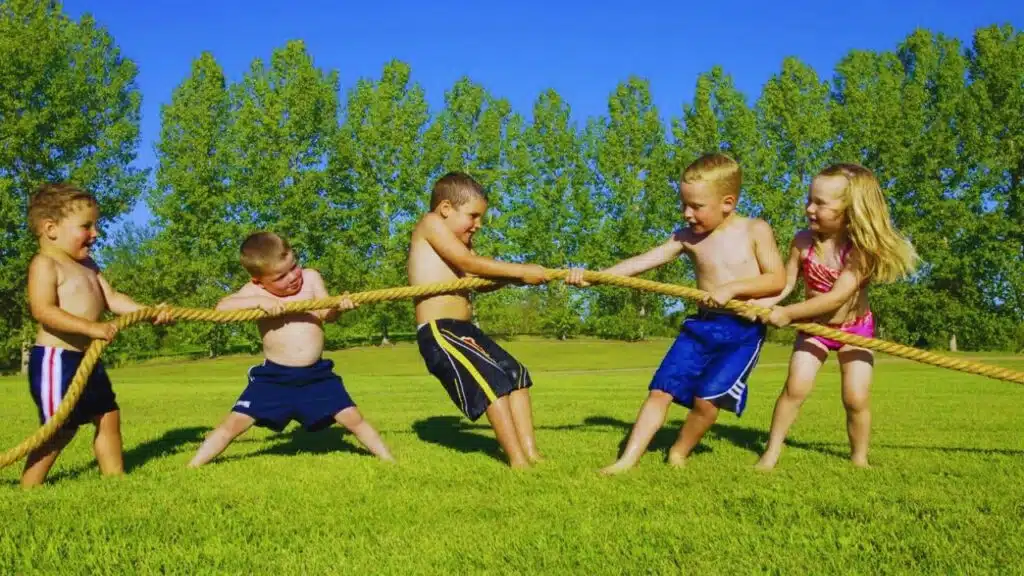Staying friends with a professional rival can be challenging, but studies suggest maintaining a friendly competition can be beneficial. The dynamics of competitive friendships are complex, involving elements of motivation, envy, personal growth, and sometimes conflict.
This article delves into the intricacies of competitive friendships, exploring whether they can be healthy and how individuals can navigate these relationships to their advantage.
The Dual Nature of Competitive Friendships
One of the most touching examples of a competitive yet friendly relationship was during the 2022 Wimbledon tennis championships in the women’s semi-final match between Ons Jabeur and Tatjana Maria.
Despite being rivals on the court, Jabeur and Maria share a close friendship. Jabeur, known affectionately as “Auntie Ons” to Maria’s children, expressed her deep affection for Maria and her family.
Their match was a testament to how professional rivalry doesn’t have to erode personal bonds. “On the court, we knew that we would go out and do our best, and afterward, we knew that we were still going to be friends,” Maria said.
10 Reasons Why Competitive Friendships Can Be Healthy
1. Boosting Motivation and Drive
Competitive friendships can push individuals to strive for their best. The desire to outperform a friend can serve as a powerful motivator, encouraging continuous self-improvement and effort.
2. Enhancing Performance
Healthy rivalry often leads to higher performance levels. When friends compete, they tend to push each other to excel, leading to better results in their respective fields.
3. Encouraging Personal Growth
Competition highlights areas for improvement and motivates individuals to develop new skills. This personal growth can be beneficial in both professional and personal contexts.
4. Building Resilience and Adaptability
Facing competition helps individuals develop resilience. The need to adapt and overcome challenges posed by a rival fosters a stronger, more adaptable mindset.
5. Strengthening Bonds Through Shared Experiences
Engaging in friendly competition can strengthen relationships. The shared experiences of competing and striving for success can deepen mutual respect and camaraderie.
6. Providing a Benchmark for Success
Having a competitive friend offers a clear benchmark for success. Observing a friend’s achievements can set higher standards and encourage one to strive for similar accomplishments.
7. Fostering a Supportive Environment
Healthy competition can create a supportive environment where friends help each other improve. They share knowledge and resources, leading to mutual growth and success.
8. Learning to Handle Success and Failure Gracefully
Competitive friendships teach individuals to handle both success and failure with grace. Celebrating a friend’s victory or learning from one’s own defeat fosters maturity and resilience.
9. Encouraging Innovation and Creativity
Rivalry can spur innovation and creativity. The need to outdo a friend encourages thinking outside the box and coming up with unique solutions and ideas.
10. Inspiring Others and Setting Positive Examples
Competitive friendships can inspire others to achieve their best. When friends set high standards and strive for excellence, they serve as positive role models, motivating those around them.
Balancing Friendship and Rivalry
Building and maintaining a friendship with a professional rival is not easy. Envy and jealousy can quickly sour interactions, leading to unspoken resentments or outright conflict.
Whether competition motivates you to perform your best or fills you with self-doubt depends on your personality and relationship with your rival.
Psychological studies offer insights into how rivalry influences our relationships and performance and provide tips to help maintain cordial relations with competitors.
The Nature of Competitive Friendships
Conflicting feelings of friendship and competition between close colleagues may be unavoidable. You are more likely to be friends with someone at the same career stage and share similar experiences.
However, this similarity can raise the potential for social comparison. Initially, this might not be obvious, but as one person progresses more quickly, it’s natural to question why and whether you could achieve similar success with more effort.
Organizational scientists have long suspected that rivalry can boost motivation, prompting both parties to perform their best. This is why many companies rank their employees’ performance and reward the highest achievers. However, the evidence is ambiguous.
According to a review of psychological literature by Christopher To, an assistant professor of human resource management at Rutgers University, while some research shows that rivalry can enhance motivation and performance, other studies find no consistent benefits.
Threat or Challenge?
Christopher To suggests that the key to these conflicting results lies in participants’ “stress appraisals”: whether they interpret competition as a threat or a challenge.
Multiple lines of research show that when we view a situation as a threat, we feel we lack the resources to succeed and focus on the negative consequences of failure, which reduces performance.
In contrast, when we see a situation as a challenge, we feel confident in our abilities and focus on the potential gains, which energizes us and enhances performance.
Factors influencing whether competition is seen as a challenge or a threat include personal self-efficacy and the nature of the relationship with the rival. If you and your rival are evenly matched and mutually encouraging, you are less likely to feel humiliated if you fail.
However, if you harbor resentments or perceive your rival as condescending and arrogant, competition may feel more like a threat, harming performance and escalating negative feelings.
Navigating Narcissism in Competitive Friendships
The effects of competition on relationships depend significantly on the personalities involved. While some individuals, like Jabeur and Maria, can compartmentalize their professional rivalry from their friendship, people with narcissistic tendencies might struggle.
Narcissistic individuals, who often have a sense of entitlement and a need for admiration, are particularly conscious of status and comparison, making them less gracious in the face of competition.
Narcissism can manifest in different ways. Some narcissists focus on self-protection and may take pleasure in their rivals’ failures. Others, more focused on self-promotion, may be less toxic in friendships.
Recognizing these differences is crucial if tensions arise. For self-protective narcissists, even mundane situations might be interpreted as competitive threats, so it’s essential to navigate these relationships with care, possibly by offering reassurance and showing appreciation.
Strategies for Managing Competitive Friendships
If you are in direct competition with friends or colleagues, several strategies can help maintain a healthy relationship.
First, frame the competition as a challenge rather than a threat. Focus on testing your abilities and achieving personal goals rather than fearing failure and its consequences.
Second, people should be separated from the problem. Avoid obsessing over your rival’s behavior and focus on what you can do to benefit yourself. This reduces unnecessary stress and prevents feelings of resentment.
Finally, keep your behavior open and collaborative. Be transparent about your goals and intentions. For example, openly acknowledge the situation if you and a colleague are vying for the same promotion. This transparency helps prevent misunderstandings and suspicions, maintaining mutual respect.
Recognizing Unhealthy Competition
While friendly competition can be beneficial, it’s essential to recognize when it turns toxic. Questions to consider include: Is the friendship making you feel bad about yourself? Do you still trust your friend? Do you celebrate each other’s wins? Are you enjoying the time you spend together? If the answer to these questions is no, it might be time to reassess the friendship.
Experts suggest two options for dealing with ultracompetitive friends: cut ties or address the issue directly. If you value the friendship, discussing the issue openly is crucial. A direct conversation can help set boundaries and reduce competitive tension.
Reflecting on Personal Competitive Behavior
If you constantly turn everything into a competition, it’s worth reflecting on how this behavior affects your friendships. Notice if your friends become quiet or disengaged during interactions, which might indicate they are uncomfortable with the constant competition.
Working with a therapist can help uncover the root causes of this behavior, such as childhood experiences or underlying insecurities.
Competitive Friendships in Different Contexts
Competitive friendships manifest differently across contexts, such as professional environments, sports, and social settings. Each context brings its own set of dynamics and challenges.
Professional Rivalries
In the workplace, competition can drive innovation and performance. However, it can also lead to stress and conflict. Maintaining professionalism and mutual respect is crucial.
Employees can benefit from structured competition, such as performance rankings, but must ensure it does not become personal vendettas.
Sports and Athletics
In sports, rivalries are often celebrated as they push athletes to achieve their best. The relationship between Jabeur and Maria at Wimbledon exemplifies how sports rivals can maintain strong friendships. Athletes usually train together, share strategies, and support each other, fostering a healthy competitive environment.
Social Settings
In social settings, competition can be subtle and sometimes toxic. Friendships based on constant one-upmanship can lead to resentment and frustration.
Recognizing and addressing these dynamics early is essential to maintain healthy relationships.
The Psychological Perspective
Psychologists have studied the impact of competition on relationships and individual well-being. Findings suggest that whether competition is healthy or harmful depends on several factors, including personality traits, the nature of the relationship, and how individuals perceive the competition.
Stress Appraisals
As mentioned earlier, stress appraisals play a significant role. Viewing competition as a challenge can enhance motivation and performance while seeing it as a threat can lead to anxiety and reduced performance.
Self-Efficacy
Individuals with high self-efficacy, or confidence in their abilities, are more likely to view competition positively. They see it as an opportunity to showcase their skills and achieve their goals.
Social Comparison
Social comparison is a natural human tendency but can be detrimental if it leads to constant self-evaluation against others. Managing social comparison involves focusing on personal growth and achievements rather than competing with others.
Benefits of Healthy Competition
Healthy competition has several benefits. It can:
- Boost Motivation: Friendly rivalry can encourage individuals to work harder and strive for excellence.
- Enhance Performance: Competing with someone of similar skill levels can push both parties to improve.
- Foster Personal Growth: Competition can highlight areas for improvement and encourage self-reflection.
- Build Stronger Relationships: When approached positively, competition can strengthen bonds by fostering mutual respect and admiration.
Risks of Unhealthy Competition
Unhealthy competition, on the other hand, can have several negative effects:
- Increase Stress: Constantly viewing competition as a threat can lead to chronic stress and anxiety.
- Damage Relationships: Unchecked rivalry can lead to resentment, mistrust, and conflict.
- Hinder Performance: Fear of failure can reduce motivation and hinder performance.
- Impact Well-being: Negative competition can affect mental and emotional well-being.
Case Study: The Wimbledon Example
The relationship between Ons Jabeur and Tatjana Maria serves as a powerful case study of competitive friendship. Despite being rivals on the tennis court, they have managed to maintain a close friendship.
Their ability to separate professional competition from personal affection highlights several key principles of managing competitive friendships:
- Mutual Respect: Both players respect each other’s skills and achievements, reducing feelings of jealousy.
- Clear Boundaries: They can compartmentalize their rivalry, ensuring it does not affect their personal relationship.
- Supportive Environment: They encourage and support each other, creating a positive competitive environment.
Expert Insights
Experts suggest that competitive friendships can be healthy if managed properly. Nick Fager, LMHC, LPCC, a therapist specializing in men’s mental health, emphasizes that healthy competition is a primary way men bond. “Healthy competition is one of the primary ways we bond and connect particularly men,” says Fager. “For many men, it’s a comfortable way of relating to other guys—because the flip side of that is just being vulnerable and open, and relationships don’t go there very often.”
Fredric Rabinowitz, PhD, a psychologist
Wrap up
Competitive friendships can indeed be healthy, provided they are managed with care and understanding. The key lies in balancing personal ambition with mutual respect and recognizing the dynamics that can either enhance or damage the relationship.
When approached positively, friendly rivalry can boost motivation, improve performance, and foster personal growth. It’s important to maintain transparency, set clear boundaries, and focus on self-improvement rather than constant comparison.
Recognizing signs of unhealthy competition, such as increased stress or damaged trust, is crucial. Addressing issues openly or seeking professional guidance can help navigate these challenges.
Ultimately, competitive friendships, demonstrate that professional rivalry and personal affection can coexist, leading to enriching and supportive relationships. By fostering a mindset of mutual respect and encouragement, individuals can enjoy the benefits of competition without compromising their friendships.









































